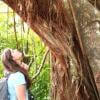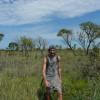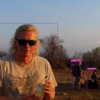With new technologies revolutionizing data collection, wildlife researchers are becoming increasingly able to collect data at much higher volumes than ever before. Now we are facing the challenges of putting this information to use, bringing the science of big data into the conservation arena. With the help of machine learning tools, this area holds immense potential for conservation practices. The applications range from online trafficking alerts to species-specific early warning systems to efficient movement and biodiversity monitoring and beyond.
However, the process of building effective machine learning tools depends upon large amounts of standardized training data, and conservationists currently lack an established system for standardization. How to best develop such a system and incentivize data sharing are questions at the forefront of this work. There are currently multiple AI-based conservation initiatives, including Wildlife Insights and WildBook, that are pioneering applications on this front.
This group is the perfect place to ask all your AI-related questions, no matter your skill level or previous familiarity! You'll find resources, meet other members with similar questions and experts who can answer them, and engage in exciting collaborative opportunities together.
Just getting started with AI in conservation? Check out our introduction tutorial, How Do I Train My First Machine Learning Model? with Daniel Situnayake, and our Virtual Meetup on Big Data. If you're coming from the more technical side of AI/ML, Sara Beery runs an AI for Conservation slack channel that might be of interest. Message her for an invite.
Header Image: Dr Claire Burke / @CBurkeSci

Explore the Basics: AI
Understanding the possibilities for incorporating new technology into your work can feel overwhelming. With so many tools available, so many resources to keep up with, and so many innovative projects happening around the world and in our community, it's easy to lose sight of how and why these new technologies matter, and how they can be practically applied to your projects.
Machine learning has huge potential in conservation tech, and its applications are growing every day! But the tradeoff of that potential is a big learning curve - or so it seems to those starting out with this powerful tool!
To help you explore the potential of AI (and prepare for some of our upcoming AI-themed events!), we've compiled simple, key resources, conversations, and videos to highlight the possibilities:
Three Resources for Beginners:
- Everything I know about Machine Learning and Camera Traps, Dan Morris | Resource library, camera traps, machine learning
- Using Computer Vision to Protect Endangered Species, Kasim Rafiq | Machine learning, data analysis, big cats
- Resource: WildID | WildID
Three Forum Threads for Beginners:
- I made an open-source tool to help you sort camera trap images | Petar Gyurov, Camera Traps
- Batch / Automated Cloud Processing | Chris Nicolas, Acoustic Monitoring
- Looking for help with camera trapping for Jaguars: Software for species ID and database building | Carmina Gutierrez, AI for Conservation
Three Tutorials for Beginners:
- How do I get started using machine learning for my camera traps? | Sara Beery, Tech Tutors
- How do I train my first machine learning model? | Daniel Situnayake, Tech Tutors
- Big Data in Conservation | Dave Thau, Dan Morris, Sarah Davidson, Virtual Meetups
Want to know more about AI, or have your specific machine learning questions answered by experts in the WILDLABS community? Make sure you join the conversation in our AI for Conservation group!
No showcases have been added to this group yet.
Key Conservation



- 2 Resources
- 19 Discussions
- 8 Groups
- @SrinivasSivakumar
- | none
I am a an Engineer at Wild Life Conservation Trust, India looking to build some tech for the WildLife.
- 0 Resources
- 0 Discussions
- 2 Groups
- @katerakelly
- | she/her
I am a machine learning researcher (PhD UC Berkeley 2021) looking for opportunities to use my skills to help combat and mitigate climate change and support biodiversity. Research experience in few-shot learning, image recognition, and reinforcement learning.
- 0 Resources
- 0 Discussions
- 1 Groups
Durrell Institute of Conservation and Ecology (DICE), University of Kent
Conservation Science PhD student at DICE, Kent. I am a GIS and remote sensing enthusiast as well as researcher. Been in love with the interaction between AI and conservation ever since I picked up a python crash course book out of curiosity during my undergraduate degree.
- 0 Resources
- 0 Discussions
- 12 Groups
Conservation Director, Texas with National Audubon Society
- 0 Resources
- 4 Discussions
- 3 Groups
- 0 Resources
- 0 Discussions
- 3 Groups
- @pchwalek
- | He/him/his
I'm a PhD candidate in the Responsive Environments Group, working on electronic systems for human and wildlife monitoring.



- 0 Resources
- 18 Discussions
- 9 Groups
I am a scientist with research background in evolutionary-ecological genomics and have impact at the senate level to prevent a government viral biocontrol release. UK based and looking to connect with passionate dreamers ready to shift paradigms
- 0 Resources
- 3 Discussions
- 9 Groups
- @LauraKloepper
- | she/her
Associate Professor at the University of New Hampshire. Our research aims to uncover behavioral principles underlying acoustic sensing, inspire the design of active sensing technology, and improve population monitoring for animal conservation.

- 1 Resources
- 3 Discussions
- 5 Groups
- @reny.tyson.moore
- | She/Her/Hers
- 0 Resources
- 0 Discussions
- 4 Groups
Tech-Driven Conservation with a Wild Twist

- 0 Resources
- 1 Discussions
- 8 Groups
- 0 Resources
- 0 Discussions
- 14 Groups
Boost cons tech capacity at an international NGO! Fauna & Flora International is offering a paid three-month internship to consolidate and share best practices for the application of emerging hardware and software...
26 August 2022
The Department of Wildlife, Fish, and Environmental Studies (WFE), SLU, Umeå, is looking for a postdoc with strong interests in wildlife conservation technology.
26 August 2022
Article
An update on Ceres Tags products that are being used in conservation
22 August 2022
Careers
Job opening at ARISE, an innovative program in the Netherlands to build a digital infrastructure for biodiversity data and services
19 August 2022
Are you creative, love new challenges and have experience developing software? The Wildlife Insights team is hiring! Join a diverse team of ecologists, data scientists, engineers and machine learning experts to protect...
10 August 2022
The Marine Robotics and Remote Sensing (MaRRS) Lab at Duke University seeks a highly motivated UAS pilot and geospatial analyst to support the ongoing development of new and existing research and conservation programs,...
10 August 2022
Hi folks! I built out a human-in-the-loop annotation platform for Felidae Conservation Fund, a SF-Bay Area nonprofit last Fall using MegaDetector. I'm looking for feedback from this amazing community around areas of...
10 August 2022
The Marine Robotics and Remote Sensing (MaRRS) Lab at Duke University seeks a highly motivated postdoctoral researcher to support the ongoing development of new and existing research and conservation programs, both...
10 August 2022
Interesting thought piece from Mark Minevitch (AI for Good) et al. on the promise of AI and other ICT innovation to deliver on climate challenges, existing ICT sector emissions - and the three types of carbon lock-in...
8 August 2022
Press Release for International Tiger Day – July 29th, 2022: For the first time ever, wild tigers and their prey have been detected by AI-powered, cryptic cameras that transmit the images to the cell phones and...
5 August 2022
Article
A gentle introduction to the exciting field of embedded machine learning.
5 August 2022
August 2025
event
September 2025
event
event
event
event
October 2025
event
event
event
December 2025
event
March 2026
November 2023
event
17 Products
Recently updated products
| Description | Activity | Replies | Groups | Updated |
|---|---|---|---|---|
| We just wanted to share this news outside the core robotics community - hoping to connect more with conservationists, researchers,... |
|
AI for Conservation, Drones | 6 months ago | |
| Hi Lucie @luciegallegos ,Great to see ecoSecrets and happy to collaborate in any way I can! All EcoAssist's models are open-source, and the inference code too. With regards to... |
+10
|
Software Development, AI for Conservation, Camera Traps | 6 months ago | |
| Another question. Right now pretty much all camera traps trigger on either PIR sensors or small AI models. Small AI models would tend to have a limitation that they would... |
|
AI for Conservation, Camera Traps, Data management and processing tools, Open Source Solutions, Software Development | 6 months ago | |
| Hi Lucille,Thank you for your reply! We’d be really interested in learning more about your developments. We’ll contact you soon to arrange a discussion.Thank you.Best regards,... |
|
Acoustics, AI for Conservation, Sensors | 6 months 1 week ago | |
| Hi Lorenzo,I highly recommend the OpenSoundscapes package (developed by the Kitzes Lab at U Pittsburgh) - there are workflows to build your own CNNs there, the documentation is... |
|
Acoustics, AI for Conservation, Animal Movement, Open Source Solutions | 6 months 1 week ago | |
| This is probably seen a bit as "self-branding" which I hope is alright, otherwise please let me know! I have spent the past few months... |
|
AI for Conservation | 6 months 1 week ago | |
| We are putting together a special issue in the journal Ostrich: Journal of African Ornithology and are welcoming (review) papers on the use of AI in bird research. https://www.... |
|
AI for Conservation, Software Development, Citizen Science, Data management and processing tools | 6 months 1 week ago | |
| Hi Adrien,Submissions are open for the special addition. Please email David Ehlers Smith - david.ehlers.smith@birdlife.org.za for more details. We are also soliciting reviewers.... |
|
AI for Conservation | 6 months 1 week ago | |
| Hello everyone!During my master thesis in engineering (past autumn), I developed Machine Learning for anti-poaching. As such, I recorded a... |
|
Acoustics, AI for Conservation, Data management and processing tools | 6 months 1 week ago | |
| Hey everyone! We’re Deep Voice Foundation, a non-profit using AI to help conserve marine wildlife. We develop acoustic... |
|
Acoustics, AI for Conservation | 6 months 2 weeks ago | |
| Hello everyone. My name is Bilal. I recently graduated with a degree in bioengineering and hold a bachelor's degree in computer science,... |
|
AI for Conservation, Animal Movement, Human-Wildlife Coexistence, Marine Conservation | 7 months ago | |
| Hey, please find here a dataset about nocturnal bird calls in Europe |
+5
|
Acoustics, AI for Conservation, Software Development | 7 months ago |
Digitising powerlines in bird migratory pathways
14 June 2016 8:53pm
Computer Vision to Identify Individual Animals
29 May 2016 4:52am
TEAM Network and Wildlife Insights
28 April 2016 12:00am
Is Google’s Cloud Vision useful for identifying animals from camera-trap photos?
20 April 2016 12:00am
ContentMine: Mining Helpful Facts for Conservation
5 April 2016 12:00am
Disruptive Technology: Embracing the Transformative Impacts of Software on Society
10 March 2016 12:00am
Ecotech Grants from the Captain Planet Foundation
18 February 2016 12:00am
Upcoming GIS and Remote Sensing Courses
9 February 2016 12:00am
[ARCHIVED] Job: ML developer at Skytruth
3 February 2016 1:22pm
Report outlines 2016's most pressing conservation issues
3 February 2016 12:00am
Wildlife Crime Tech Challenge: Winners Announced!
22 January 2016 12:00am
Introductions
10 December 2015 8:13pm
10 December 2015 8:41pm
To start things off...
I'm David J Klein. My background is in deep learning, machine learning, neuroscience, neuromorphic computing, and signal processing. I've been doing the startup thing Silicon Valley for the last 11 years after being in academia for a while. I've worked on products ranging from speech recognition systems, to cloud-based deep learning platforms. These days, some use the blanket term "AI".
For the last several years I've been developing software for Conservation Metrics which gives their analysists the ability to use deep learning to process large volumes of audio and image data from remote sensors in order to monitor population density changes of endangered species, detect collisions of birds and bats with infrastructure, and find rare and elusive species.
More broadly, I'm interested in integrating many disparate sensing domains from eDNA, to land-based sensors, to GIS data in order to provide tools to conservation scientists and ecologists that will enable them to develop a higher resolution understanding of the health of ecosysems around the globe and their response to positive or negative human interventions.
I'm looking forward to interacting with you all. Please let me know what other questions you have for me, and other ways I can help.
Regards,
David
17 January 2016 9:08pm
Hi,
I am jason Holmberg from WildMe.org. I am one of the developers of Wildbook (wildbook.org), an open source data management platform for wildlife research. I'm using ML as part of the IBEIS.org project to boost and metascore multiple computer vision algorithms for individual humpback and sperm whales. David, I would love to speak offline if you have the time: jason@wildme.org.
Cheers,
Jason
Google Releases Tensor Flow
18 November 2015 12:10am
20 December 2015 7:05pm
"TensorFlow, you see, deals in a form of AI called deep learning. With deep learning, you teach systems to perform tasks such as recognizing images, identifying spoken words, and even understanding natural language by feeding data into vast neural networks. "
Would this be applicable to an acoustic monitoring network? For example. my research has shown tigers have unique, identifiable vocalizations down to the individual and sex. If this software is applied to my recording network for tigers, would it be able to automatically recognize and categorize these individuals?
For example: when it hears Tiger 108, it would know and then input that it heard Tiger 108 at a particular time and date.
11 January 2016 12:38pm
The catch will be (and for any neural network or AI type learning I would expect the same) the training phase. If you are able to tell the sounds apart or identify a specific sound as belonging to a certain individual, the AI should afterwards be able to automatically identify the critical factors needed to distinguish the voices of the individuals. But it will need enough input from each individual as well as the different vocalizations used by tigers. AFAIKT it will be able to do this automatically afterwards, but I am not sure if (a) you will get enough identifiable vocalisations and (b) with a wide enough range of typical tiger vocalisations for it to be really reliable. Training on zoo animals might work? I am also interested in this, but for jackals instead of tigers.
11 January 2016 2:30pm
I'd like to suggest our open source package Wildbook (http://www.wildbook.org) as a base data management platfor for this. I agree with the above that there are a number of challenges around the vocalizations themselves, but having the identity information in a good database and data model is a great foundation. That's what we're doing for our computer vision/deep learning project at www.IBEIS.org.
Our non-profit WildMe.org is running both. Feel free to contact us with questions. We have played with time series matching (often used for speech recognition)...but actually for whale flukes. Would be happy to discuss potential for audio ID.
Deep Learning Image Recognition of Species In Global Wildlife Crime Reporting
31 December 2015 7:28pm
Big Data and Conservation: Deluge or Drought?
22 December 2015 12:00am
Cheap Space, DIY Imaging and Big Data
21 December 2015 12:00am
The Impact of the Internet of Things
10 December 2015 12:00am
Harnessing Big Data to Combat Illegal Wildlife, Timber and Fisheries Trade
 Rachel Kramer
and 2 more
Rachel Kramer
and 2 more
26 November 2015 12:00am
Technology for Traceability
 Daniel Brizuela
and 1 more
Daniel Brizuela
and 1 more
26 November 2015 12:00am
From Data Collection to Decisions
6 November 2015 12:00am
The Social Lives of Conservation Technologies and Why They Matter
2 November 2015 12:00am













































6 June 2016 11:17am
Hi Jason,
Thanks for sharing this demo, it's interesting to see the fluke id process in action. Is this part of the flukebook project? How do you see the project progressing - are there opportunities for people to get involved or challenges it would be helpful to get outside input on?
Cheers,
Stephanie